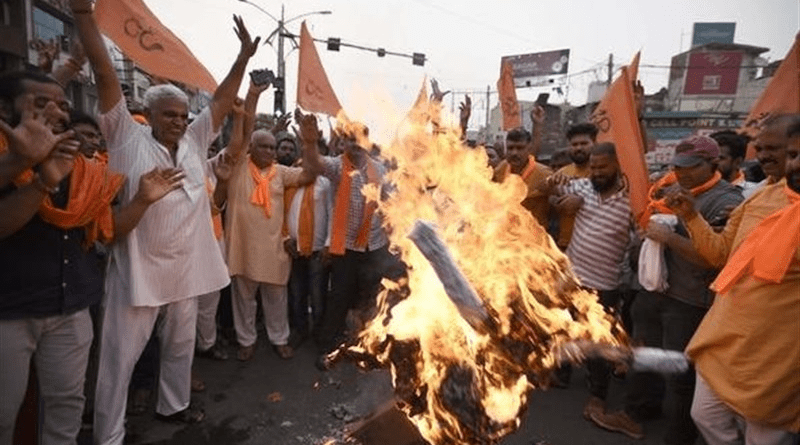Nuh Violence Ahead Of Upcoming Lok Sabha Elections Raises Alarms In India – OpEd
By Shaimin Raja
The concerning issue of the persecution of Muslims in India has become increasingly alarming in recent years, casting a somber shadow over the nation’s aspirations of unity and cultural diversity. Despite constituting approximately 14% of the total population, India’s Muslim community has been subjected to a distressing array of discrimination, violence, and harassment at the hands of both Hindu extremist groups and state authorities.
A stark reminder of this intensifying concern is the disturbing episode of the Haryana riots that unfolded in July 2023. These riots, marked by communal clashes, erupted from the Nuh district of Haryana, a region characterized by its predominantly Muslim population. At the heart of this eruption of violence lay a religious procession orchestrated by the Vishva Hindu Parishad (VHP), a Hindu nationalist organization. This procession, winding its way through a predominantly Muslim locality, became a spark that ignited existing tensions. The inflammatory nature of the procession, with its loud music and provocative slogans, further fueled the growing animosity. A video circulating on social media featuring an individual wanted for the murder of two Muslim men declaring his intent to join the procession only added fuel to an already volatile environment.
In the face of mounting tension, these hostilities erupted into violent confrontations, with both factions resorting to stones, sticks, and even firearms. Despite the intervention of law enforcement, their efforts proved inadequate against the fervor of the mobs. Tragically, lives were lost, including police officers and civilians, while scores were left injured. The turmoil spread to neighboring areas, necessitating the imposition of curfews, the suspension of internet services, and the deployment of substantial paramilitary and police forces in an attempt to restore order. Nevertheless, the undercurrents of unease persisted, shrouding the region in uncertainty for an extended period.
In the aftermath of the riots, serious concerns have arisen regarding the actions of the Haryana government. Reports indicate that over 300 Muslim-owned homes and businesses in Nuh district have been razed since August 3, 2023, purportedly under the guise of addressing illegal encroachments or alleged involvement in the violence. However, these claims are vehemently contested by local residents who assert that authorities targeted their properties without due process or advance notice. The consequences of this demolition campaign have been profound, leaving numerous families bereft of their livelihoods and sources of sustenance. For many, these properties held a treasure trove of memories and were supported by valid ownership or tenancy documentation.
The aftermath of the riots also encompassed a series of unfortunate events for Muslims in Nuh and adjacent areas of Haryana. Eyewitness accounts and media reports have documented the horrifying burning and vandalization of Muslim-owned properties, ranging from mosques and shops to hotels and vehicles, by rampaging Hindu mobs during the clashes. In some instances, the response of law enforcement and administrative bodies appeared inadequate, and allegations of complicity on their part have only fueled the already charged atmosphere. Moreover, Muslims have faced a distressing barrage of threats, abuse, and marginalization from certain Hindu groups that erroneously laid blame on them for the outbreak of violence. The wanton destruction of Muslim properties, coupled with the forced displacement of individuals, has generated an overarching sense of insecurity and alienation within the Muslim community. The pervasive feeling of not belonging in their own homeland is a tragic consequence of these acts of violence and dispossession.
The incidents of property destruction and forced displacement serve as poignant reminders of a deeply rooted pattern of persecution and discrimination against Muslims in India. These actions not only violate the principles of justice and equality but also pose a dire threat to India’s democratic values and diverse cultural fabric. Such occurrences sow seeds of animosity and division among religious communities, undermining the foundation of harmony and peaceful coexistence. It’s important to recognize that the Haryana riots are not isolated incidents; they reflect a longstanding history of hostilities between Hindus and Muslims that has persisted since the partition of India in 1947. The aftermath of partition witnessed a massive displacement of people along religious lines, and the country has since grappled with sporadic outbreaks of sectarian violence, leaving in its wake a trail of countless lives lost.
This ongoing persecution is exacerbated by the growing influence of Hindu nationalism and extremism in recent times. The ruling Bharatiya Janata Party (BJP), led by Prime Minister Narendra Modi, has introduced policies that have further marginalized and alienated the Muslim minority. Contentious legislations like the Citizenship Amendment Act (CAA), the National Register of Citizens (NRC), and the Uniform Civil Code (UCC) have disproportionately affected Muslims, intensifying concerns about unequal treatment and discrimination under the law. Moreover, the support and endorsement of radical Hindu groups such as the Vishva Hindu Parishad (VHP), Rashtriya Swayamsevak Sangh (RSS), and Bajrang Dal have perpetuated a hostile narrative that vilifies Muslims as invaders, terrorists, and perpetrators of cattle-related crimes.
The persecution of Muslims in India stands as a grave violation of their fundamental rights and human dignity. This disturbing trend also poses a severe threat to the foundational principles of India’s secular democracy and its rich tapestry of multiculturalism. Urgent action is imperative from the Indian government to protect the rights and dignity of all its citizens, regardless of their religious affiliation, and to prevent further injustice. Accountability for events like the Haryana riots must be established, and concerted efforts to promote dialogue, understanding, and acceptance among diverse religious groups must take center stage. These measures are not only crucial for addressing the immediate concerns but also for safeguarding India’s future as a nation that upholds the ideals of unity in diversity, as envisioned by leaders like Mahatma Gandhi.

